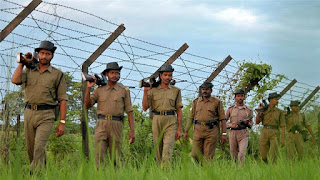- Get link
- X
- Other Apps
- Get link
- X
- Other Apps
Dhaka, Bangladesh - After nearly 70 years of statelessness, more than 50,000 people will now receive citizenship and all its benefits after a historic border agreement between India and Bangladesh.
Prime Minister Narendra Modi's first visit to Dhaka resulted in the land boundary agreement with the swapping of 161 "enclaves" along the 4,100km stretch of border. A deal had been in the works since 1974 to help the tens-of-thousands living in the region, but it had not been ratified until Modi's weekend trip.
Officials and political analysts heralded the Indian prime minister's visit as a sign of deepening relations between the South Asian neighbours.
The border agreement involves the swap of 111 Indian enclaves to Bangladesh, and 51 in Bangladesh to India. Residents on either side will be able to choose the citizenship they prefer.
The 50,000 stateless people suffered from not having basic government services, but also faced restrictions on movement as they did not possess passports. Healthcare and schools were largely absent, and they were not allowed to own property or vote in elections.
"This has been a culmination of the struggle by the enclaves people over the decades," Diptiman Sengupta, an enclaves activist, says that "The exchange … will also see as a new era of cooperation between the two countries."
Source: Aljazeera
Prime Minister Narendra Modi's first visit to Dhaka resulted in the land boundary agreement with the swapping of 161 "enclaves" along the 4,100km stretch of border. A deal had been in the works since 1974 to help the tens-of-thousands living in the region, but it had not been ratified until Modi's weekend trip.
Officials and political analysts heralded the Indian prime minister's visit as a sign of deepening relations between the South Asian neighbours.
The border agreement involves the swap of 111 Indian enclaves to Bangladesh, and 51 in Bangladesh to India. Residents on either side will be able to choose the citizenship they prefer.
The 50,000 stateless people suffered from not having basic government services, but also faced restrictions on movement as they did not possess passports. Healthcare and schools were largely absent, and they were not allowed to own property or vote in elections.
"This has been a culmination of the struggle by the enclaves people over the decades," Diptiman Sengupta, an enclaves activist, says that "The exchange … will also see as a new era of cooperation between the two countries."
Source: Aljazeera
- Get link
- X
- Other Apps

Comments
Post a Comment